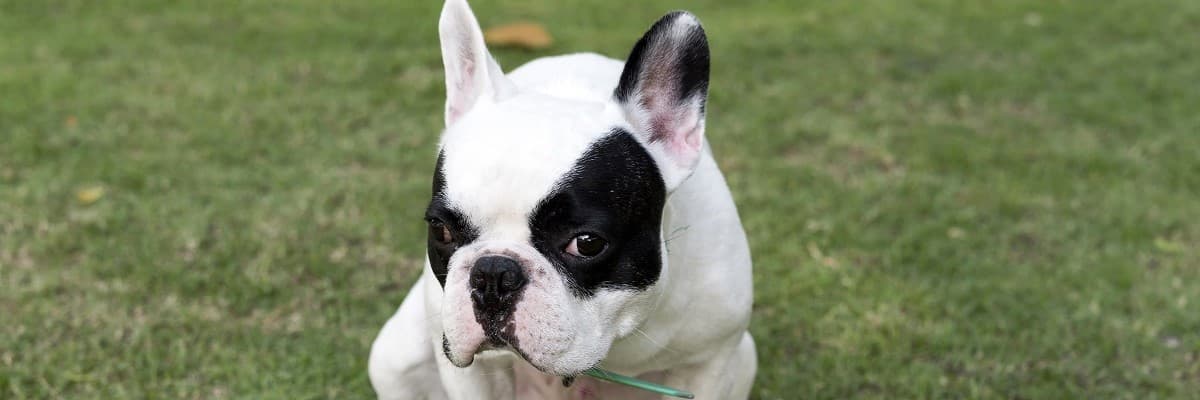Do you have a French bulldog? They’re a beloved companion breed bred from toy bulldogs and Parisian ratter dogs that eventually created the breed you know today. But, just because these dogs are small doesn’t mean they should be too skinny.
If you’re worried that your French bulldog is too skinny, you probably want to find a way to pack on the pounds. Generally, the best ways to treat underlying conditions and change the diet or lifestyle are to encourage muscle development.
Is My French Bulldog Too Skinny?
Frenchies aren’t exactly big breeds, and it isn’t much you can do to alter an adult dog’s final size healthily. If your dog is truly too skinny, you can help them gain a bit of weight relatively easily, but if you have a naturally petite dog, you make your pup overweight by altering it.
| Ideal Weight for French Bulldogs: A full-grown Frenchie is generally relatively small. Of course, there will be variance in size, but on average, you can expect your male dog to be between 20 and 28 pounds, while a female is usually a bit lighter at 17 to 26 pounds. |
| Is Being Underweight Always Bad?: Remember that being underweight isn’t always bad. Sometimes, you have a particularly tiny dog for the breed. If both parents for your Frenchie were quite small, your pup probably wouldn’t be on the larger side. It is probably fine if your dog is proportionately small, though your vet will confirm this. |
| How to Know if My Bulldog is too Skinny: One of the easiest ways to tell if your Frenchie is too skinny is to look at their body type. Look down on your pup from above. Do you see their ribs protruding? Regardless of the dog’s general size, you should be able to feel but not see ribs on their sides. Visible ribs are a telltale sign of being underweight. Is your dog slowing down due to a lack of energy? Is your dog not toileting enough? These are signs that there may be a problem that you will need to address. |
https://littlefrenchdog.com/how-much-do-french-bulldogs-weigh/
Why does my French Bulldog look skinny?
If your dog is too skinny, it is probably a cause. You could cause skinniness, or it could be caused by a medical condition that will need treatment. Thankfully, most causes can be treated.
| Not Eating Enough: The classic reason for being underweight is not feeding your dog enough. If you aren’t giving your pup the right amount of food, you can’t expect your dog to maintain weight according to its size. Or, your pup may not be eating enough for some reason, such as pain or a medical condition, even if you are providing the right amount of food. |
| Feeding the Wrong Food: The food you feed may be inappropriate. If you feed something your dog is intolerant to, you can cause all sorts of issues. If your dog can’t process and digest the food, you won’t be able to keep the weight on them. |
| Worms or Other Parasites: Worms or other parasites can also cause weight loss and an inability to put any weight on. These are most notable by looking at the dog’s stool to see if you can see signs of them. However, not all parasite areas are visible. A vet should be able to diagnose parasites if they are present. |
| Other Medical Conditions: Other medical conditions can lead to weight loss and being underweight. Diabetes can cause the dog to lose weight because your Frenchie won’t process glucose as energy. Cancer, kidney problems, heart disease, allergies, and even anxiety may also cause problems with weight loss or putting weight on for your pup. |

When Should I See the Vet about my French Bulldog Being Skinny?
Any time you are worried about your dog’s health, going to a vet is usually recommended. It’s good for you to make sure that your pup is healthy. There are a few signs that you’ll want to look out for. If you notice these signs, you probably should reach out to the vet for a thorough evaluation.
| Are They Eating Regularly?: If you notice a change in your dog’s eating habits or your dog doesn’t regularly eat enough food for its size, you should speak to the vet. Irregular eating habits or suddenly changing habits usually shows that there is a problem. |
| Are They Drinking too Much or Not Enough?: If your dog seems to drink constantly or not enough, there is probably a more serious sign. Too much water could imply diabetes, while not enough could be related to kidney issues. Problems with drinking can become quite serious if left unchecked. |
| Are There Toilet Issues?: Is your dog’s toileting unusual? Not going enough implies the dog isn’t eating enough. Going too much and having runny stools implies that their stomach cannot handle the food consumed. You may even notice worms in the stool. |
| How is Their Energy?: A dog that becomes listless, tired, and doesn’t move much is a dog that needs to be checked out. You should not hesitate to go to the vet if you notice that your pup struggles to find the energy for normal daily habits. |
| Are There Any Other Concerns?: Any other concerns, such as itchiness, lumps, pain, wounds, hair loss, or other strange symptoms, always warrant vet visits. If you’re concerned about anything, it’s always worth asking for a professional’s opinion. |
How can I bulk up my French Bulldog?
Suppose you want to fatten up your Frenchie. In that case, you have three primary options: You can put on fat and build muscle, or you can treat an underlying condition or cause that is causing weight loss in the first place. How you do each is a bit different. However, both options will increase calorie content, so fat or muscle can be developed.
| Building Muscle: Building muscle is done just like it is in people. Adding more food gives the dog’s body the energy to start putting on muscle. To build muscle in your Frenchie, you’ll need to take them for more exercise while also upping their caloric intake. And, by exercising, you encourage the muscles to develop as well. While it might seem counterintuitive to exercise to help add weight, Frenchies are meant to be stocky and muscular. |
| Gaining Fat: If your dog is truly underweight or too skinny, you may need to up the fat content on its body. Gaining fat is as simple as upping calories. Stick to high-quality foods with high-quality ingredients. Ideally, all dogs would be fed a raw, whole food diet, but this is expensive and time-consuming. If you are feeding kibble, make sure that you pick those that have real meat as the primary ingredients and avoid filler ingredients. |
| Treat Underlying Conditions: Finally, if you want your dog to gain weight, you must ensure no underlying causes to keep weight off. Ensure your dog gets a clean bill of health, and putting on weight should be as simple as upping food intake and adding extra calories. |
Are There Any Things I Should Be Aware of?
Before you head off to start fattening up your dog, there are a few more things to consider.
Feeding Your Dog the Right Way
First, make sure you feed your dog the right way. Adults require food twice daily, once in the morning and once in the evening. Puppies under the age of 8 months generally eat as much as six times daily. Healthy food is generally 18% lean protein and 5% fat, with the remainder being a high-quality carbohydrate. Your Frenchie should be eating between 25 and 35 calories per pound of body weight per day to stay healthy.
Genetics and Your French Bulldog
Genetics will influence your dog’s weight. It could be that your dog is naturally petite or is naturally larger than average. Or, your dog could be predisposed to certain medical conditions that could influence your dog’s weight. If possible, look to your dog’s parents or littermates to better understand what your dog is likely to be.

Conclusion
These days, 1 in 2 dogs is overweight or obese, so before you move forward in adding weight to your dog, make sure it is necessary. If your dog truly is underweight, you’ll want to take time to add weight healthily.
Frenchies are small dogs, so even a few pounds of weight change can make a big difference. At the end of the day, a healthy weight will help your pup live a happier, longer life and is worth the effort.

